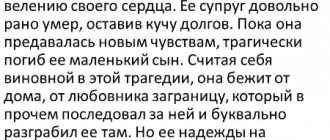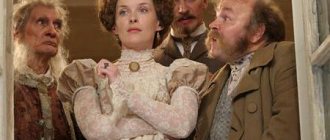History of creation
Writer Anton Pavlovich Chekhov
Literary scholars believe that the play is autobiographical. The plot of the work is built around a bankrupt noble family forced to sell the family estate. Chekhov happened to find himself in a similar situation, so he knew first-hand the experiences of his heroes. The mental state of each character was familiar to the writer, as a person faced with the need to leave his home. The narrative is permeated with subtle psychologism.
The innovation of the play lay in the fact that its characters were divided not into positive and negative characters, not into main and secondary ones. These were people of the past, present and future, whom the writer classified according to their worldview. Lopakhin was a representative of the present, although sometimes there is a feeling that he could also lay claim to the position of a man of the future.
Anton Chekhov in the garden
Work on the work was carried out from 1901 to 1903. Chekhov was seriously ill, but completed the play, and in 1904 the premiere of a theatrical production based on a new plot took place on the stage of the Moscow Art Theater.
Through the eyes of other heroes
The reader is presented with an unusual hero, whose business acumen and prudence are combined with a desire to help people. His affection for the Ranevskys contradicts his desire to buy their house. The characters in the play looked at Lopakhin differently, and each gave their own description of the merchant’s personality:
- Gaev gives a clear negative characterization of Ermolay Alekseevich. The main character's brother calls him a boor and a narrow-minded person. The only thing that makes him more beautiful is that he cares for Varya.
- Ranevskaya treats Ermolai warmly. In her opinion, he is a kind person and an interesting personality. At the same time, in all the woman’s words one can feel that, in her opinion, they were and remain representatives of different classes of society.
- Simeonov-Pishchik characterized Yermolay with the quote “Man, we must tell the truth... most worthy.” He also said that the man was very smart.
- Petya Trofimov considers the hero a predatory beast, capable of removing everything in its path. But at the same time he briefly says that he loves him and treats him well.
Lopakhin himself takes any criticism calmly, including Gaev’s, let him say what he wants. He does not strive to be attractive to everyone, but it was important for him that Lyubov’s amazing eyes looked at him as before. And even though she didn't take him seriously, he saw her as someone more than just an old acquaintance.
"The Cherry Orchard"
The biography and fate of Ermolai Alekseevich Lopakhin is closely connected with the life of the Ranevskaya family. The hero's father was a serf to Father Ranevskaya and lived in small trade. The young lady showed sympathy for the young man, who was constantly bombarded by his father, and he talks about this, recalling the story of life in serfdom. Ranevskaya’s attitude excited the consciousness of Ermolai Lopakhin. He liked the caress of an attractive girl, but he understood that there was an abyss between them based on slavery. Even the meaning of the hero’s surname and name suggests that he is intended for a completely different society.
Ranevskaya (scene from the theater)
Lopakhin became rich by becoming a merchant and was able to change his fate. He made himself and, despite the lack of proper education, became one of the people, of which he is incredibly proud. Although he admits that books are empty for him, and his handwriting has never acquired a noble appearance. The former serf achieved everything through hard work; his whole life consists of work. Lopakhin is in a hurry all the time, looking at his watch, waiting for a new meeting. He knows how to manage his own time and finances, unlike the Ranevskaya family.
Lopakhin more than once starts a conversation about the cherry orchard, offering help. He easily parts with money by lending money, but in the case of the estate being sold, something else is involved: Lopakhin loves Ranevskaya. He acts nobly, offering to buy the garden and rent it out as summer cottages, although he could have quietly bought it for his own use.
Lyubov Ranevskaya and Ermolai Lopakhin in the theater
Lopakhin demonstrates business qualities that are surprising for a former serf. He is practical and calculating, but does not use his talents against those close to him. At the same time, some characters give an unflattering description of the hero, believing that Lopakhin is pursuing the possibility of a profitable deal.
Throughout the action, the conversation repeatedly comes up about Lopakhin's marriage to Vara. Ermolai does not marry the girl not because of the lack of a dowry, but because of the issue of cutting down the garden. Varya sees in the groom only a businessman for whom the wedding can be beneficial as a deal. Incoherent dialogues between the characters make it clear that there is no mutual understanding between them. The love for Ranevskaya, warming in Lopakhin’s heart, does not allow him to think about other women. The hero proposes to Varya solely at the request of his beloved.
Illustration for the book “The Cherry Orchard”
In the play, each character loses something along with The Cherry Orchard. Lopakhin loses faith in love, realizing that the image of a simple man is forever attached to him in Ranevskaya’s perception. Having bought Ranevskaya’s garden at auction, he, a representative of the future, the owner of an estate where his family was in service, falls into euphoria. But, having acquired the garden, he did not achieve the fulfillment of a dream that remained unattainable. Ranevskaya leaves Russia, going to Paris, and Lopakhin is left alone with the estate where he spent his youth.
At the end of the play, Ermolai Alekseevich talks about his awkward life. It becomes obvious to him that everything he strived for turned out to be empty. He realizes how many people in his country exist aimlessly and do not understand what they live for.
Still from the film “The Cherry Orchard”
The author's attitude towards Lopakhin is not as negative as that of other characters in the play. Chekhov considers Lopakhin a “klutz” and justifies the hero with a lack of education and upbringing. Many of Lopakhin’s actions indicate that, despite his business acumen, the man is not distinguished by simple forethought. He is late for the train to meet Ranevskaya. Wanting to help her out of trouble, he buys a garden. He decides to ask Varya to marry and immediately forgets about it.
The image of Lopakhin has been incredibly relevant in recent decades. This is a “hero of our time”, skillfully building a business, but callous in soul. A person incapable of perception and thinking exclusively about his own self-realization through material wealth. Ermolai Lopakhin presents with his description an anti-portrait of Chekhov. A sensitive writer, whose works are full of philosophical meaning and tragedy, is the complete opposite of the son of serfs who has made it into the people.
Life path
From the very beginning, the life path of Ermolai Alekseevich Lopakhin is intertwined with the fate of the Ranevskys. His father was a serf to Lyubov Andreevna’s father and a tradesman in a local shop. One day it happened that his father hit Ermolai and broke his face. Then the still young Ranevskaya helped him, washed him and calmed him down with the words: “Don’t cry, little man, everything will heal before the wedding.”
Ermolai Alekseevich remembered these words for the rest of his life. He took them ambiguously. After all, the woman seemed to take pity on him and console him. However, this “little guy” offended him in the past and still clings to his pride. He couldn't imagine a worse quote. After all, it was his father who was an ordinary man, a hard worker, and he was able to rise to his feet and become a “man,” a merchant.
Now the hero lives a wealthy life and wears good clothes - and he himself has achieved this. His parents didn’t teach him anything, because they themselves didn’t know how to read and write, and his father could only beat him out of his drunken eyes.
Recalling his origin, Lopakhin says that, in essence, he was and remains a man, despite his wealth. After all, he has terrible handwriting, and he doesn’t think anything in books; one day he started reading and fell asleep from boredom while doing it.
Film adaptations
The first film adaptation of the play by Russian playwright Chekhov was made in Japan in 1936 by director Morato Makoto. The characters were modernized to match current Japanese images. In 1959, director Daniel Petri shot the film “The Cherry Orchard,” in which Martin Hirte played the role of Lopakhin. In the 1973 production by Jan Bull, the image of Lopakhin was absent, and in the Soviet film adaptation of 1976, Yuri Kayurov appeared in the role of the merchant in Leonid Kheifetz's teleplay.
Vysotsky plays in the play “The Cherry Orchard”
Richard Eid in 1981 directed Bill Paterson as Lopakhin, and in the 1983 Soviet film by Igor Ilyinsky, Yermolai was played by Viktor Korshunov. Anna Chernakova, who directed the film “The Cherry Orchard” 10 years later, invited Alexander Feklistov to play the role of Lopakhin. The image of the merchant in the television film by Sergei Ovcharov in 2008 went to Roman Ageev. The most famous performer of this role on the theater stage was Vladimir Vysotsky.
Quotes
Lopakhin is beautiful by the fact that he does not forget his place. Like any person who has not seen a prosperous life, he is proud of what he managed to achieve without patronage and help. For him, the main expression of success is material wealth:
“My father, it’s true, was a man, but here I am in a white vest and yellow shoes.”
Illustration for the play “The Cherry Orchard”
The hero understands how valuable an education he did not receive would be in his current situation. He also feels that he lacks the ability to understand the world that he is so eager to get into, where he wants to be accepted as “one of his own”:
“My dad was a man, an idiot, he didn’t understand anything, he didn’t teach me, he just beat me when he was drunk, and that was all with a stick. In essence, I’m just as much of a blockhead and an idiot. I haven’t studied anything, my handwriting is bad, I write in such a way that people are ashamed of me, like a pig.”
Lopakhin's main achievement is that he manages to understand: the life he strives for is worthless. Money doesn't bring him pleasure. Owning a cherry orchard makes him understand that his dreams turned out to be empty, the pleasure from their fulfillment is doubtful. Work becomes the main life credo for the hero:
“When I work for a long time, tirelessly, then my thoughts are lighter, and it seems as if I also know why I exist. And how many people, brother, are there in Russia who exist for no one knows why.”


